In Athens, it’s caused by an economy in crisis; in Munich, by an economy that’s booming. The result, though, is the same – a worsening homeless problem that doesn’t reflect a city’s wealth
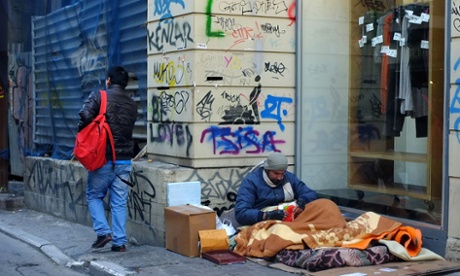
One is plush, pampered and unmistakably prosperous, the third-largest city of Europe’s mightiest economy – a place of wide, well-swept streets, ample, well-groomed parks and solid, well-kept apartment buildings.
Munich is home to just under 1.5 million people and such giants of German industry as luxury carmaker BMW, electronics heavyweight Siemens, truck manufacturer MAN and insurance titan Allianz. This summer, unemployment in the city stood at a fraction over 3%, the lowest of any major German city. It is, plainly, a fine place to live: last year, the lifestyle magazine Monocle ranked Munich the world’s most liveable city, with the highest quality of life.
The other is one of the world’s most ancient cities, home to Plato and Aristotle, its recorded history stretching back some 3,400 years. The “cradle of western civilisation”, the “birthplace of democracy”, Athens remains a major commercial hub of southeastern Europe.
But it is also, these days, capital of a country that has suffered perhaps more than any other from the 2008 global economic and financial crisis, and the strain is showing: streets are crumbling; a third of shops are shuttered; signs shouting Enoikiazetai – For Rent – are everywhere.
Through seven years of deep recession, Greece’s GDP has sunk by a quarter. The official unemployment rate here is 27%, including 52% of under-25s. That means some 180,000 (probably many more) of Athens’ 670,000 residents – and maybe more than 1 million of the 4 million-odd people who live in the greater Athens urban area – are now without work.
These are, plainly, very different cities in very different countries, facing – at this point in history – very different fortunes. But for very different reasons, both are currently confronting a problem that, it seems, even the world’s wealthiest cities cannot shake.
“Homelessness,” says Ivan Juric of the John S Latsis Public Benefit Foundation – a major philanthropic donor that funds nearly 50 rigorously selected social programmes for homeless and near-homeless people in Athens – “does not reflect a city’s socio-economic status.”
It also has to be redefined. FEANTSA, the federation of national homelessness organisations in the EU, argues that if durable solutions are to be found, “homeless” cannot mean just people sleeping rough and in emergency shelters. The term also has to include all those living in temporary, unfit or insecure housing: with friends or family; in abandoned buildings; even in their own flats, but without water of electricity because they are unable to pay their bills.
One such, in Athens, might be Vassilis Dimopoulos, 53, a former graphic equipment salesman, who was making very good money indeed – more than €3,000 a month – until the company that employed him folded in 2008. “The industry was already in trouble, and I saw it coming,” he says.
“I sold my home in 2007, though the small profit I made is gone now. For a time, I lived in a place belonging to my cousin; she didn’t want rent, but I couldn’t afford electricity. Then she needed it back. I was six months on the street.”
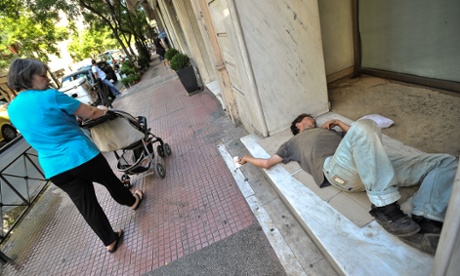
Now Dimopoulos lives in a Red Cross hostel. Helped by the income he gets from selling Athens’ street paper, Shedia – “Raft” – he hopes soon to be able to move into a small rented room. But he’s nervous. “It’s very hard to find a job now,” he says. “In sales, my field, hundreds apply for every post.”
According to Jenny Varvagianni at Athens city hall, 1,000 people are now sleeping rough in downtown Athens. (NGOs mostly reckon the number is more like 1,500, and say that by FEANTSA’s definition, as many as 15,000 Athens residents can be classified as homeless.)
Most rough sleepers here are men; roughly half are not Greek. More than 60% are addicted to alcohol or drugs, and two-thirds have physical and, particularly, mental health issues: a familiar profile. But the city is more alarmed by another, fast-growing group: those who fall into that broader definition, its new and hidden poor and homeless.
This, Varvagianni says, is what risks pushing Athens and other urban centres in Greece “beyond a socio-economic crisis, and into a humanitarian crisis. What’s bringing us to our knees are the people who had jobs, had their lives in order, were supporting their families, educating their kids ... Regular, middle-class couples who lost both, or maybe just one job, and are now on the brink. The new poor; the new homeless.”
It is very hard to know how many people in this situation there are, Varvagianni says: “Family support is strong in Greece, so very few of the new poor are actually sleeping on the street. But many have had water or electricity cut off, or face eviction at any moment, because they’ve fallen so far behind with their rent or mortgage.”
Many are also now using services like soup kitchens and social health clinics. So, Varvagianni says, “We’re afraid: how long can this last? People’s pay and pensions have been cut, everyone is more and more squeezed, landlords too. It’s going to get worse before it gets better.”
Unlike Athens, where city authorities and a raft of national and international charities and NGOs are working together – often for the first time – to find what remedies they can in a country whose welfare system has never been robust, Munich, says Monika Maier, manager of the city’s emergency housing programme, has “really a very good system. An excellent system, in fact, one of the best in Germany.”
One who has benefited might be Abdulvahed Atchikzai, now 63 and originally from Afghanistan, who is managing to support 14 people – his extended family, now in Pakistan – on the money he earns selling Munich’s street paper, BISS. Atchikzai has lived in Hamburg, where for 18 years he was a taxi driver, and London, where he ran a market stall, before ending up, penniless, in Munich three years ago.
After a period sleeping rough and then several months in the city’s shelter for homeless men, on Pilgersheimerstrsse (“Very good, very clean,” he says, “but a lot of crazy people”), he was introduced to BISS and has been selling between 400 and 500 copies a month ever since. “They found me a flat, a very nice flat,” he says. “I feel very lucky. I have my dignity; I can support my family.”
After a period sleeping rough and then several months in the city’s shelter for homeless men, on Pilgersheimerstrsse (“Very good, very clean,” he says, “but a lot of crazy people”), he was introduced to BISS and has been selling between 400 and 500 copies a month ever since. “They found me a flat, a very nice flat,” he says. “I feel very lucky. I have my dignity; I can support my family.”
Reserved, as in most countries, for those entitled to state benefits (which usually means you have to have worked for at least a year), Munich’s homelessness programme aims to help vulnerable people move from shelters through interim and supported accommodation to fully independent flats, offering advice and counselling on employment, benefits, budgeting and all aspects of social reintegration along the way.
Specialised services are also available for more at-risk groups: the elderly, single mothers, people with more severe mental health problems and those with addiction issues. But the problem, Maier says, is that even Munich’s system “is now coming under huge, and increasing, pressure. It can’t cope.”
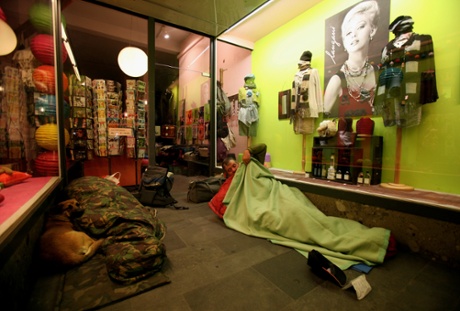
The pressure comes from a very different quarter than in Athens: Munich’s homelessness system is a victim of the city’s economic success. Each year, explains Richard Schlickenrieder, head of planning for the city’s housing and homelessness department, around 25,000 more people coming to live in the city, drawn above all by its buoyant labour market.
“People come to try their luck,” he says. “And usually, they find work.” If it’s in a restaurant, though, they’ll be earning perhaps €800 a month. Contract cleaning or security work, probably less: “And you won’t find a one-bedroom flat in Munich for less than €500, even €600.”
Since 2011, city hall says, the number of people sleeping rough on Munich’s streets has risen from 350 to about 550. Around 300 more homeless people sleep in shelters paid for largely by the city but run by churches and charities; a further 750 are in city-run temporary and intermediate housing; and nearly 3,000 in other longer-term, assisted city accommodation. Demand has nearly doubled since 2009.
Private landlords – who own 90% of the city’s housing – do not need low-paid workers. At the same time, an acute shortage of affordable accommodation, public or private, means those in it are not moving on. And hemmed in by surrounding municipalities, the city has no room to build and expand.
“The whole system,” Maier says, “is blocked. There are more and more people coming into it, and fewer and fewer leaving it.” As a result, concludes Schlickenrieder, pointing to a graph that shows an almost precise correlation between average rents and demand for acute housing, Munich now needs some 600 more beds for homeless and near-homeless people every year.
Increasing numbers of migrants from eastern Europe and, since last year, of refugees from Syria and Iraq, have exacerbated the problem. Munich’s homeless, says Schlickenrieder, “used to be German; now 60% of the people we help are not.”
The city was recently forced to launch an entire separate winter protection programme for migrants – such as recent arrivals from Bulgaria and Romania – who are not entitled to benefits, including a brand new homeless hostel near central station, open from November to March.
But with 8,400 refugees projected by the end of next year, Schlickenrieder reckons that in all, the city will probably need 5,000 new emergency and short-term beds over the next 18 months.
“It really is,” he says, “a big problem. This is now a system under very, very severe pressure.”
For the moment, though, it is holding – just. At the city’s Theestube, a drop-in cafe for homeless and near-homeless people, manager Marc Bocklet explains that up to 120 people now use the centre every day, to take a shower, cook themselves a meal, get a cheap hot drink and seek advice from social workers and employment advisers.
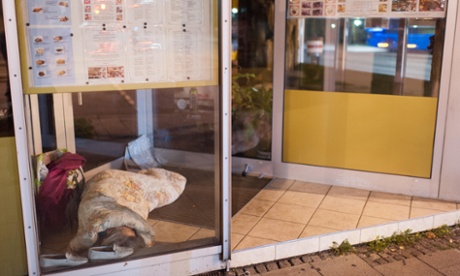
“Not just people without a roof, but people afraid they are about to lose it,” he says: the centre provides legal and financial counselling to help prevent evictions. It helped 1,400 people last year, double the total a decade ago.
“The really big, long-term problem in this city is not a lack of work, but a lack of affordable and social housing,” Bocklet says. “Munich hasn’t built enough, and now it has nowhere to build. That’s a far bigger problem than the economic downturn or higher immigration.”
One of the places Bocklet’s team can refer homeless people to is the Pilgersheimerstrasse shelter. Smart and well-kept, it is 80%-funded by the city but run by KMFV, part of of the Catholic relief network Caritas. Deputy manager Eva Fundel shows me round its 179 neat single beds in twin rooms, lockers, showers, laundry, canteen, cafe, doctor’s surgery, psychiatric help, social workers.
“We are,” she says, “full up, pretty much all the time. I’ve been here 12 years, and especially in summer we always used to have empty beds, maybe 20 or so. This August we had none. And people are staying longer, because there’s nowhere for them to go on to – 53 nights now, on average.”
Last year, Fundel says, the organisation was able to help 46 people into independent apartments – less than half as many as a couple of years ago. The profile of this shelter’s clients has changed, too: not so long ago, three quarters were German; now it’s barely half. On one day last month, the shelter counted 33 nationalities among its clients.
In the cafe, run by former residents, I meet 53-year-old Toni Menacher. He’s been sleeping at Pilgersheimer for three months, since his long-term girlfriend, who had multiple chronic health problems, died in June. Menacher had spent most of the past decade caring for her; before that, he worked 14 years in a car parts factory that eventually made him redundant.
Now he makes enough to pay his board and lodging at the shelter – €5 for his bed, €1.20 for breakfast, €2.30 for lunch, €1.80 for dinner –selling Munich’s street newspaper, BISS. “I’m not sure what I’d be doing without it,” he says. “It’s been a lifesaver for me. Really, a lifesaver.”
Founded in 1993, the paper – sold for €2.20 a copy, of which half goes to the vendor – is Germany’s oldest street paper and last year employed 97 vendors, paying each between €700 and €2,400 a month depending on how many copies they sell and whether they are part- or full-time.
BISS, notes Hildegard Denninger, the magazine’s former manager, is not an official part of Munich’s homeless system, but “we work alongside it. Over the years we’ve helped a lot of people.” She, too, agrees the city’s system “is beginning to crumble. For now, compared to many places, it is still very good. This is still a rich country. But things are getting harder.”
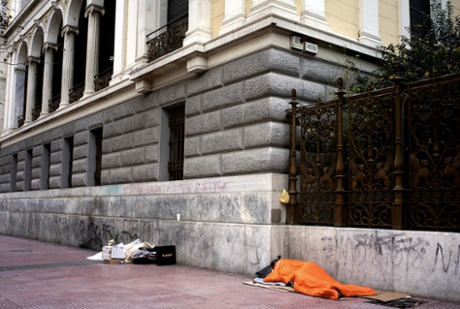
In Athens, they have been hard for quite some time now. The city is doing what it can, but as FEANTSA points out, in the face of an estimated 25% increase in homelessness since 2009, Greece still largely has “no integrated strategy for homelessness” and tackles it in “an indirect and incoherent way”.
Draconian, often indiscriminate spending cuts – Athens city hall has seen its budget slashed by 35% – have had a catastrophic impact on policies that could hardly have been described as effective to start with.
At city hall, Varvagianna says that in such conditions, she feels “proud of what Athens is doing”. The city’s central soup kitchen now serves 1,400 meals a day, while its two hostels accommodate 150 homeless people. What’s new, though, are its partnerships with corporate sponsors, charities and NGOs.
An industry-funded social pharmacy issues free medicines; money from US investor George Soros helped fund a Citizens’ Solidarity Hub that has redistributed 400 tonnes of donated food, clothing, toys and household goods to some 14,000 vulnerable people.
“There has been opposition,” says Varvagianna. “People say: this is a disgrace, we should be doing this with public money. I say: Show me the money. But I think attitudes are starting to change in Greece. They need to. We have, as a society, to change. Our future will be about solidarity.”
With Medecins sans Frontieres, the city has just opened a new night shelter. And backed by other, private sponsors including a major telecoms group and the American Legion, some small-scale prevention programmes – a supported housing unit for 17 at-risk families, a “family solidarity” scheme offering practical and psychological support, along with free food and essentials, to a further 600 households – have been launched.
But it remains too little and, in the eyes of many NGOs, much too piecemeal: more about meeting urgent, basic short-term needs than developing longer-term, structural housing solutions. “The handbook just really needs to change here,” says Juric, of the Latsis Foundation.
“The approach is almost like alms-giving, when what’s needed are constructive, efficient, evidence-based social programmes, based on best practice. Many countries are on the way to resolving this ... but I’ve seen more palpable change in places like Nepal and Ghana than Greece.”
With more than 3 million people in the country now without health insurance or social security cover, major international NGOs have stepped in to provide essential front-line services abandoned by a state in full retreat (the words “failed state”, in Greece, are not far from many people’s lips).
On Deligiorgi Street, the Praksis Day Centre for the Homeless offers showers, a laundry room, an internet corner, a hairdressing service (equipment donated by L’Oreal), a film club, a library, employment counselling, duty social workers and a primary health care clinic.
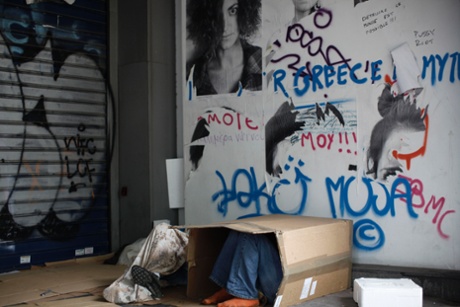
Opened in May 2012 as an offshoot of a Medecins sans Frontieres project that provided healthcare to undocumented migrants, the centre, financed by private donations and from EU funds, has since registered some 4,000 clients – Greek, but also 70 other nationalities – and sees between 100 and 120 people every day. Around 40% are sleeping rough.
“The biggest part of this crisis,” says the centre’s manager, Ioanna Pertsinidou, “is behind closed doors. It’s ordinary, low-to-middle income people who have no idea where to go for help. Who never had the faintest idea that they would one day not be able to meet their day-to-day needs.”
According to a recent OECD report, 17% of the Greek population are currently unable to meet their daily needs for food, and around 30% are living below the poverty line.
Praksis runs another centre in central Athens, for homelessness prevention, that has helped some 2,300 families on the brink of losing their homes over the past two years: legal aid, financial counselling, finding nearly 70% a job. “The problem,” says Pertsinidou, “is there’s no safety net. It’s a mess. Austerity has been implemented blindly.”
Unemployment benefit in Greece is €360 a month for a year (€200 thereafter); to qualify for benefits, you need to have worked 125 consecutive days during the previous two years. And once you’re out of work, you lose – almost invariably – your health insurance.
Overall, according to the OECD, Greek health spending is now 25% less than it was in 2008. Which is why on Sapfous Street, Medecins du Monde (MdM) operates a drop-in primary healthcare clinic for homeless people, of all nationalities, and Greeks without health insurance.
Its volunteer doctors and nurses treat around 200 people a day, says MdM’s Christina Samartzi, for a range of problems, including dermatological infections and chronic illnesses like diabetes for which patients can no longer afford the medicine. Of late, it has been particularly busy giving children essential vaccinations that their parents can no longer afford, and examining and treating pregnant women.
“The health system here,” says Samartzi, “is getting steadily worse. More people are being excluded from it every day. Before 2010, our patients here were almost all migrants. Since 2010, there’s been a huge increase in the number of Greeks.”
But ordinary Greeks are organising too. Shedia, Greece’s street newspaper, launched last year and now employs 200 vendors in Athens and Thessaloniki, many making up to €450 a month: good money in today’s Greece. At 22,000 copies, it has become one of the country’s three best-selling monthlies.
“Since the beginning of this year, 12 of our vendors have moved out of hostels or off the street and into their own apartments,” says Chris Alefantis, the former journalist who founded it. “Three more are on their way.”
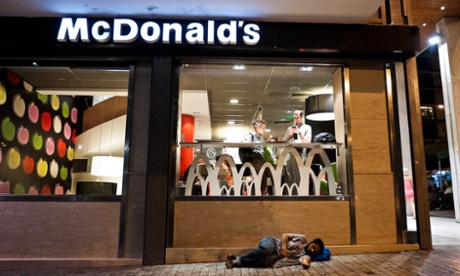
More than 90 people are waiting to become vendors. Alefantis has had out-of-work architects, electricians, journalists through his door – most now living in hostels or squats, or in their own flats but without water or electricity. “You know the saying, everyone’s only two pay cheques away from the street?” he says. “Those two months happened in Greece.”
Vendor Theotokis Vonitsanos, 49, had been a waiter, a builder and a courier, earning €1,000 a month, before he found himself jobless in 2009. He now lives in his mother’s apartment, often without utilities.
Yannis Kotsos, 39, a trained infant teacher, owed a year’s rent to his landlord before he found work at Shedia. “Even today, I owe four or five months,” he says. “It’s only by the generosity of my landlady that I’m not on the street. And she really is generous – my rent is her only income.”
At Solidarity for All, which facilitates Greece’s new, self-organising solidarity movement, Christos Giovanopoulos describes a fast-growing, decentralised network of more than 400 citizen-run public health clinics, food distribution centres, cooperatives, social enterprises, legal support hubs and education classes.
“In 2011 and 2012, many people survived on their savings – they got by,” he says. “Now it’s really biting. So this movement isn’t about charity, it’s about developing a whole different model. The state is no longer functioning.”
What’s clear, says the Latsis Foundation’s Juric, is that Greece’s existing public sector facilities and service providers are “inadequate in quantity, and ineffective in meeting the real needs” of homeless and near-homeless people.
Juric is struggling to persuade the city to adopt, even on a limited scale, a Housing First-style policy: a relatively recent strategy based on the idea that a homeless or near-homeless person or household’s primary need is stable housing, and that their other problems can be addressed once that one is resolved. The strategy has shown good results in the US, Canada, Finland and several French cities.
Fuelled by economic meltdown, the near-collapse of most state provision and a widespread official unwillingness to seek more creative solution with what few resources remain, Greece’s homelessness problem looks set to get a lot worse before it starts getting any better.
In Munich, a booming economy, growing population and rising rents are combining with a chronic shortage of affordable housing (and of land to build it on) to push a highly efficient, enviably funded homelessness programme to breaking-point – with much the same consequences.
Rich city or poor city, homelessness spares neither.



Δεν υπάρχουν σχόλια:
Δημοσίευση σχολίου
Σημείωση: Μόνο ένα μέλος αυτού του ιστολογίου μπορεί να αναρτήσει σχόλιο.